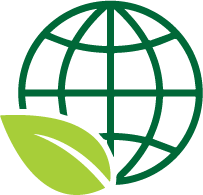
ENVIRONMENT
Green Energy is one of the leading companys in the field of
clean, efficient and sustainable energy, contributing to environmental protection

SAFE
Green Energy factories use leading technologies to help the
system operate stably, safely and maximize costs
environment
The environment in the boiler industry is a very important factor, as this industry has a significant impact on air quality, water resources, and human health. To minimize negative impacts on the environment, the following measures can be taken:
- Energy saving:
- More efficient boiler design, using advanced technology to reduce energy consumption.
- Improve boiler insulation to reduce heat loss.
- Reduce toxic emissions:
- Use exhaust gas filtration technology, such as electrostatic precipitators and NOₓ, SOₓ emission reduction systems.
- Use cleaner fuels like natural gas instead of coal and oil.
- Strengthen control of CO2 emissions and other greenhouse gases.
- Water and waste management:
- Reuse and treat water efficiently to reduce consumption and protect water resources.
- Treat waste from boiler operations, such as ash and oil residue, to minimize soil and water pollution.
- Switch to green technology:
- Apply renewable energy solutions in boiler operation, such as using solar energy or biomass energy.
- Invest in research and development of environmentally friendly boiler technology.
- Proper maintenance and operation:
- Ensure regular maintenance to avoid damage and leakage; this helps the boiler operate more stably and efficiently, minimizing energy waste.
- Train boiler operators according to environmental standards, helping to raise awareness and skills in minimizing environmental impact.
Through these innovations and solutions, the boiler industry can contribute to environmental protection and sustainable development.


SAFE


Safety in the boiler industry is an extremely important factor, not only for the safety of workers but also for the sustainability and efficiency of these systems.
Industrial boilers: with the function of generating heat to supply steam to industrial systems, there will be some risks if the operation and maintenance are not done properly… Below are some important factors to promote safety in the boiler industry:
- Periodic inspection and maintenance
- Pressure Testing: Ensure that the boiler is operating within safe pressure and temperature limits. Boilers need to be pressure tested and monitored regularly to avoid situations where they exceed safe levels.
- Maintenance of safety valve system and control devices: Ensure that safety valves, pressure control devices, and critical water-out protection systems are in good working order.
2. Employee training
- Boiler Operator Training: Boiler operators need to be thoroughly trained in how to operate the boiler safely. Understanding procedures and emergency situations helps to minimize risks.
- Incident handling and response training: When an incident occurs, employees must know how to handle and stop the boiler in time.
3. Compliance with legal regulations
- Compliance with safety standards and regulations: Standards such as ASME (American Society of Mechanical Engineers) or national boiler safety regulations must be strictly followed. These regulations provide guidance on how to design, operate, and maintain boilers to ensure safety.
4. Monitoring and warning system
- Continuous monitoring systems: Monitoring systems, including pressure, temperature, water level, and oxygen concentration sensors, help detect and alert promptly when problems occur.
Early warning: Early warning systems for situations such as low water levels, high pressure, or unstable temperatures can help shut down a boiler before a major failure occurs.
5. Energy and fuel management
- Fuel quality control: Fuel used in boilers must be of good quality to increase boiler combustion efficiency and reduce consumption rates.
- Water supply monitoring: Ensure that the operating water level in the boiler is always maintained at a safe level by sensor systems and water pumps using automatic control systems.
6. Risk control and monitoring
- Risk Analysis: It is important to conduct risk analysis and assess the impact of incident scenarios so that preventive measures can be taken.
- Emergency Management: Procedures for responding to emergencies, such as fires or gas leaks, should be clear and regularly practiced.
7. Ensure water quality in boiler
- Water quality control: Water in the boiler has been through a water treatment system that meets standards and quality criteria, ensuring good control of impurities or water hardness to avoid scale build-up, reduce efficiency, and possibly damage the boiler.
8. Using modern technology
- New technology updates: Advanced technologies help improve efficiency and safety in boiler operation, such as automation systems that monitor and control the operating process.
In short, safety in the boiler industry requires a close combination of technical factors, standard operating procedures, and people’s awareness.










